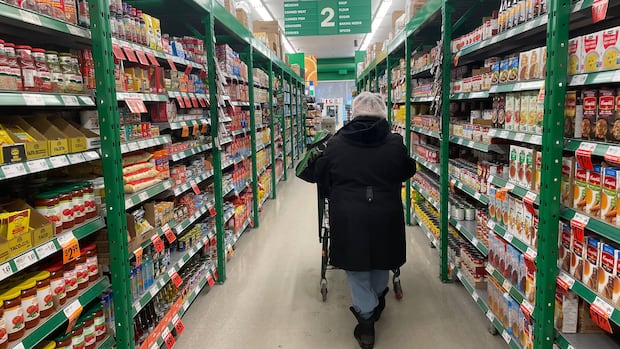HealthEating a diet highest in ultra-processed foods is tied to an increased risk of early-onset colorectal cancer when compared with consuming such foods sparingly, a new U.S. study suggests, pointing to one potential reason for rising rates of the cancer in young adults.Findings of large U.S. diet study point to need for healthier choices, Canadian medical experts sayAmina Zafar · CBC News · Posted: Nov 13, 2025 11:00 AM EST | Last Updated: 3 hours agoListen to this articleEstimated 5 minutesThe audio version of this article is generated by text-to-speech, a technology based on artificial intelligence.Ultra-processed foods are often found in the middle aisles of the grocery store and are shelf stable. They typically contain high levels of sugar, salt, saturated fat and food additives with industrial-type ingredients associated with cancer, obesity and Type 2 diabetes. (Erik White/CBC)Eating a diet highest in ultra-processed foods is tied to an increased risk of early-onset colorectal cancer when compared with consuming such foods sparingly, a new U.S. study suggests, pointing to one potential reason for rising rates of the cancer in young adults.Ultra-processed foods are ready-to-eat or ready-to-heat foods that often contain high levels of sugar, salt, saturated fat and food additives to keep them shelf stable and preserved — items like mass-produced bread, breakfast cereals and instant soups. The rise in colorectal cancer rates among people in their 20s, 30s and 40s in a number of countries outpaces what could be attributed to genetics alone, scientists say. That’s prompted medical researchers to scrutinize lifestyle factors such as changes in diet, weight, physical activity levels, drinking patterns and more.Now a 24-year study of almost 30,000 female participants in the Harvard-led Nurses Health Study II has found that those who ate the highest levels of ultra-processed food had about a 1.45-fold higher risk of developing a colorectal polyp — which could be a precursor lesion to cancer, gastroenterologists say — compared to those who consumed the least. Participants self-reported answers on food questionnaires every four years. The highest consumption group ate about 10 servings per day on average, compared with three servings per day on average in the lowest group. “There seems to be growing evidence that there is a cogent reason to think about limiting one’s intake of ultra-processed food,” said Dr. Andrew Chan, a gastroenterologist at Mass General Brigham and a professor of medicine at Harvard Medical School in Boston.Chan, a co-author of the study published Thursday in JAMA Oncology, said the higher risk identified from eating ultra-processed food is on par with the risk associated with obesity or a lack of physical activity.Choose fresh, whole foodsModelling published in August suggests that colorectal cancer in young adults will double about every 15 years in Canada, the U.S. Australia and the U.K. in both sexes.Dr. Shady Ashamalla, a surgical oncologist at Sunnybrook’s Odette Cancer Centre in Toronto, said he was impressed by the study, noting he’s increasingly treating younger patients. “My very simple advice is do what you can,” when it comes to reducing consumption of ultra-processed foods, Ashamalla said. Colorectal cancer keeps rising among younger adults. No one’s sure whyRegistered dietitian Russell de Souza, an associate professor and researcher at McMaster University’s Population Health Research Institute, gave similar advice.”Try to limit ultra-processed foods — they’re often loaded with sugar, salt and unhealthy fats, but short on nutrients. These foods can raise your risk for obesity, diabetes and even cancer, and they’re designed to make you eat more. Whenever possible, choose fresh, whole foods instead,” de Souza said in an email. Dietitians encourage Canadians to cook with whole foods at home when possible. (Natalia Klenova/Shutterstock)While the link between ultra-processed foods and colorectal cancer isn’t as firmly established as major risk factors like family history, the presence of polyps in the colon or rectum, or excess weight, de Souza noted the Harvard team found the effect held even after taking weight and diabetes into account. How these foods trick you into loving themWant to avoid ultra-processed foods? Cook more often, choose whole foods Other studies have also linked their consumption to other diseases.”The consistency of [ultra-processed food] associations across heart, brain and gut diseases suggests a real concern. Food is something we control daily, so small shifts toward whole foods can make a big difference,” he said.For colorectal cancer prevention and treatment, Ashamalla also called on health-care systems to use the results from studies like this to:Encourage vigilance about getting symptoms like blood in stool or changes in bowel habits checked out.Consider decreasing the age recommendation for screening the general population with at-home kits and colonoscopies, down from the current age of 50.Usually when young adults are diagnosed with colorectal cancer, it has grown to the point of manifesting with symptoms, Ashamalla said. In contrast, in older adults, polyps are often flagged before they become advanced cancers.Chan sees broader questions to answer around whether the relationships the study observed are due to cause and effect — so we can act as a society. “Should we actually do more to limit our populations’ exposure to ultra-processed food through things like food labels or or changing the way we think about regulating foods?”ABOUT THE AUTHORAmina Zafar covers medical sciences and health for CBC News. She contributes to CBC Health’s Second Opinion, which won silver for best editorial newsletter at the 2024 Digital Publishing Awards. She holds an undergraduate degree in environmental science and a master’s in journalism.With files from Melanie Glanz
Eating more ultra-processed foods tied to increased risk of early-onset colorectal cancer











